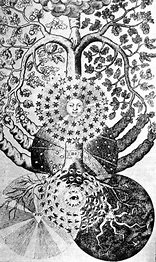Jacob Boehme and the Problem of Pain
Jacob Boehme described consciousness as a tincture or essence simultaneously existing within and beyond our material form. He separated this "tincture" into seven fundamental "qualities". These attributes or characteristics are found in all living things, and Boehme connected them with humoral features associated with astrological influences.
 Thus, the first attribute, dryness, is connected to Saturn and the characteristic of melancholy. It is a metaphor for the force of death. The second attribute is sweetness, which is linked to Jupiter, blood, and the origins of life. Bitterness is related to Mars, and represents a bad temperament. These destructive attributes equate with the third quality. The Sun and Moon stand for night and day, and the ideas of good and evil, right and wrong. These are connected to the fourth quality of fire, and its corresponding opposite, water. Love, linked to Venus symbolising birth, is the fifth quality. Mercury is related to the sixth quality, sound, which stands for expression, spirit and illumination. The seventh and final quality is the physical component connected to the Earth.
Thus, the first attribute, dryness, is connected to Saturn and the characteristic of melancholy. It is a metaphor for the force of death. The second attribute is sweetness, which is linked to Jupiter, blood, and the origins of life. Bitterness is related to Mars, and represents a bad temperament. These destructive attributes equate with the third quality. The Sun and Moon stand for night and day, and the ideas of good and evil, right and wrong. These are connected to the fourth quality of fire, and its corresponding opposite, water. Love, linked to Venus symbolising birth, is the fifth quality. Mercury is related to the sixth quality, sound, which stands for expression, spirit and illumination. The seventh and final quality is the physical component connected to the Earth.
Boehme wrote that balance is attained like the manifestation of a dramatic "lightning flash". For instance, he referred to the first three qualities as generative motion resulting from a corresponding reaction. For example, love and fear equate with the opposing forces of the fiery water in the fourth quality. Harmonizing opposites does not mean the corresponding forces are destroyed or objectively defeated. On the contrary, it means that they become balanced and thereby creative. This is crucial because we see peace, love, and harmony as processes, not starting points. Balancing love and fear is necessary since it validates our experiences in life. Why? Because Boehme reasoned that suffering contains the information needed to comprehend evil's causes, intent, and characteristics. Recognising that both must occur is essential, as we are equally capable of both. Boehme would write,
"Seeing, therefore, we are in such horrible danger in this world and environed with enemies on every side, we have a very unsafe pilgrimage or journey to walk; and, above all, our evil and corrupt nature and will is inclined to all evil."

Boehme's take on the seven qualities makes it easier for those struggling with a traditional perception of God as a stern, distant figure passing judgment. This changes an ingrained perception of God inherited from our faith background, culture and social history. Boehme's metaphysical hypothesis is important because it presents a God who understands our suffering and embraces both the Dark and Light Worlds, albeit a Divinity where no evil manifests because of the presence of an all-powerful love embracing it. This envisages a process where love overcomes fear in man — a process that leads to our self-discovery and encompassing the divine image or tinctura within us.

Article (c) M.R. Osborne 2024






